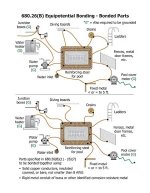Hi. we are replastering our pool and re-doing/pouring a new deck.
Today the electrician was here and I am a little skeptical about the bonding; he attached a #8 bare copper wire to the rebars that extend out from the bond beam (every other 2 re-bars for a total of 6). BUT we only had these rebars around the section where the deck will be poured. He could not find any on the back and side of the pool that has no deck (is landscaped). I argued with him that he still needed to go around the entire pool to make a loop with the copper wire, but he said that was not necessary. Can anyone confirm this that the wire does not have to go around the pool ?
He basically started from a copper rod that he put in the ground 8ft deep, then went on one end of the pool re-bars, went 1/2 way around the pool attaching at 5 more re-bars, linking the 2 pool copper wire cables, crossed over the dirt from our future deck and hooked up the 2 pumps and heater.
Also, our 3 underground metal electrical conducts were totally rusted and he replaced them with PVC conducts. But the last 5 feet of conduct he left the thicker metal/copper/brass conduct (because it was anchored in the pool wall) and he connected it with a connector to the PVC conduct. I asked him if the connector was rust proof and he said they don't make a rust proof connector, but he would use electrical corrosion tape to protect it. Does any one know if this works ? or if there is a rust proof connector ? any potential issues ?
Thanks for any help.
Today the electrician was here and I am a little skeptical about the bonding; he attached a #8 bare copper wire to the rebars that extend out from the bond beam (every other 2 re-bars for a total of 6). BUT we only had these rebars around the section where the deck will be poured. He could not find any on the back and side of the pool that has no deck (is landscaped). I argued with him that he still needed to go around the entire pool to make a loop with the copper wire, but he said that was not necessary. Can anyone confirm this that the wire does not have to go around the pool ?
He basically started from a copper rod that he put in the ground 8ft deep, then went on one end of the pool re-bars, went 1/2 way around the pool attaching at 5 more re-bars, linking the 2 pool copper wire cables, crossed over the dirt from our future deck and hooked up the 2 pumps and heater.
Also, our 3 underground metal electrical conducts were totally rusted and he replaced them with PVC conducts. But the last 5 feet of conduct he left the thicker metal/copper/brass conduct (because it was anchored in the pool wall) and he connected it with a connector to the PVC conduct. I asked him if the connector was rust proof and he said they don't make a rust proof connector, but he would use electrical corrosion tape to protect it. Does any one know if this works ? or if there is a rust proof connector ? any potential issues ?
Thanks for any help.


